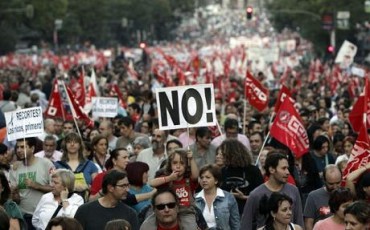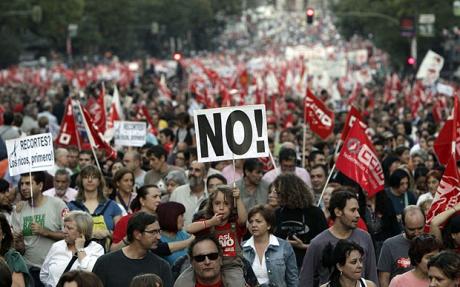Telegraph.co.uk

If you strip away the political correctness, Chapter Three of the IMF’s World Economic Outlook more or less condemns Southern Europe to death by slow suffocation and leaves little doubt that fiscal tightening will trap North Europe, Britain and America in slump for a long time.
The IMF report ? “Will It Hurt? Macroeconomic Effects of Fiscal Consolidation” ? implicitly argues that austerity will do more damage than so far admitted.
Normally, tightening of 1pc of GDP in one country leads to a 0.5pc loss of growth after two years. It is another story when half the globe is in trouble and tightening in lockstep. Lost growth would be double if interest rates are already zero, and if everybody cuts spending at once.
“Not all countries can reduce the value of their currency and increase net exports at the same time,” it said. Nobel economist Joe Stiglitz goes further, warning that damn may break altogether in parts of Europe, setting off a “death spiral”.
The Fund said damage also doubles for states that cannot cut rates or devalue ? think Spain, Portugal, Ireland, Greece, and Italy, all trapped in EMU at overvalued exchange rates.
“A fall in the value of the currency plays a key role in softening the impact. The result is consistent with standard Mundell-Fleming theory that fiscal multipliers are larger in economies with fixed exchange rate regimes.” Exactly.
The lesson of the 1930s is that politics can turn ugly as slumps drag into a third year, and voters lose faith in the promised recovery. Unemployment is already 20pc in Spain. Spanish society will face a stress test.
We are seeing a pattern ? first in Ireland, now in Greece and Portugal ? where cuts are failing to close the deficit as fast as hoped. Austerity itself is eroding tax revenues. Countries are chasing their own tail.
The rest of EMU is not going to help. France and Italy are cutting 1.6pc GDP next year. The German squeeze starts in earnest in 2011.
Given the risks, you would expect the ECB to stand by with monetary stimulus. But no, while the central banks of the US, the UK, and Japan are worried enough to mull a fresh blast of money, Frankfurt is talking up its exit strategy. It risks repeating the error of July 2008 when it raised rates in the teeth of the crisis.
The ECB is winding down its lending facilities for eurozone banks, regardless of the danger for Spanish, Portuguese, Irish, and Greek banks that have borrowed ?362bn, or the danger for their governments. These banks have used the money to buy state bonds, playing the internal “carry trade” for extra yield. In other words, the ECB is chipping at the prop that holds up Southern Europe.
One has to conclude that the ECB is washing its hands of the PIGS, dumping the problem onto the fiscal authorities through the EU’s ?440bn rescue fund. That is courting fate.
Who believes that the EMU Alpinistas roped together on the North Face of the Eiger are strong enough to hold the rope if one after another loses its freezing grip on the ice?




